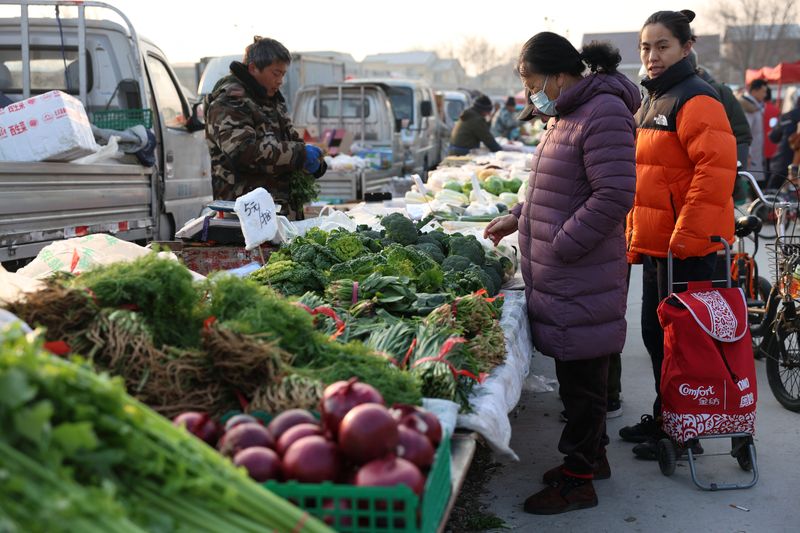By Liangping Gao and Ryan Woo
BEIJING (Reuters) -China's consumer inflation unexpectedly eased in September, while producer price deflation deepened, heightening pressure on Beijing to roll out more stimulus measures quickly to revive flagging demand and shaky economic activity.
Finance Minister Lan Foan told a news conference on Saturday there will be more "counter-cyclical measures" this year, but officials did not provide details on the size or timing of fiscal stimulus being prepared, which investors hope will ease deflationary pressures in the world's second-largest economy.
The consumer price index (CPI) rose 0.4% from a year earlier last month, the slowest in three months, against a 0.6% rise in August, data from the National Bureau of Statistics (NBS) showed on Sunday, missing a 0.6% increase forecast in a Reuters poll of economists.
The producer price index (PPI) fell at the fastest pace in six months, down 2.8% year-on-year in September, versus a 1.8% decline the previous month and below an expected 2.5% decline.
"China faces persistent deflationary pressure due to weak domestic demand. The change of fiscal policy stance as indicated by the press conference yesterday (Saturday) would help to deal with such problems," said Zhiwei Zhang, Chief Economist at Pinpoint Asset Management.
Chinese authorities have stepped up stimulus efforts in recent weeks to spur demand and help meet an around 5.0% economic growth target for this year, though some analysts say the moves may only offer temporary relief and stronger measures are needed soon or the weakness could extend well into next year.
The central bank in late September announced the most aggressive monetary support measures since the COVID-19 pandemic, including numerous steps to help pull the property sector out of a severe, multi-year slump, including mortgage rate cuts.
Analysts and investors are now hoping that a meeting of China's parliament expected in coming weeks will unveil more specific proposals.
"The size of the fiscal stimulus matters. Decisive action is required before deflationary expectations become further entrenched," said Pinpoint's Zhang.
However, many China watchers say Beijing also needs to firmly address more deeply-rooted structural issues such as industrial overcapacity and sluggish consumption.
Excessive domestic investment and weak demand have pushed down prices and forced companies to reduce wages or fire workers to cut costs, further dampening consumer confidence.
Core inflation, which excludes volatile food and fuel prices, stood at 0.1% in September, down from 0.3% in August, also hinting that deflation pressures were mounting.
The core reading has been in the low range of below 1.0% for 20 consecutive months, reflecting a lack of momentum in prices and the need to stimulate consumption, said Bruce Pang, Chief Economist and Head of Research in Greater China at JLL.
CPI was unchanged month-on-month, versus a 0.4% gain in August and below an estimated 0.4% increase.

Food prices perked up 3.3% on-year in September compared with a 2.8% rise in August, while non-food prices was down 0.2%, reversing a 0.2% uptick in August.
Among non-food items, the decline in energy prices deepened, and tourism prices switched to down from up with declines in airfares and hotel accommodation widening, said the NBS in an accompanying statement.